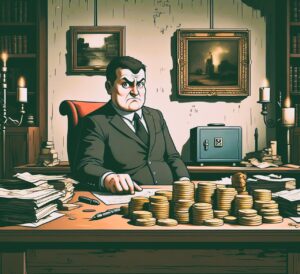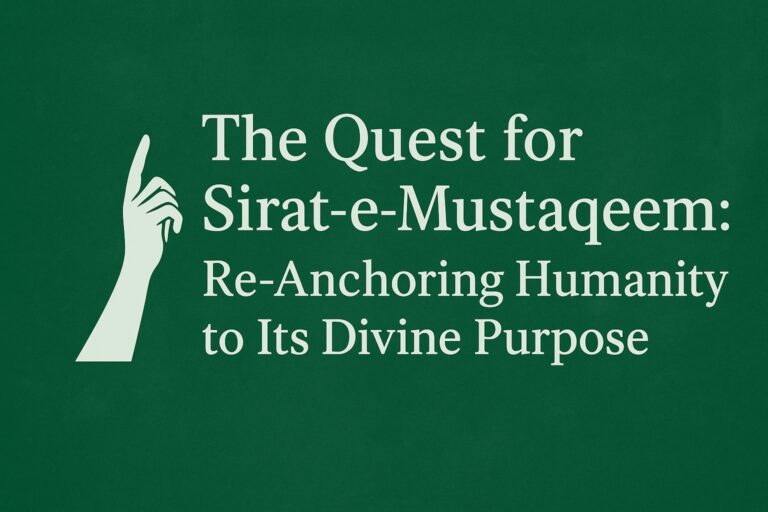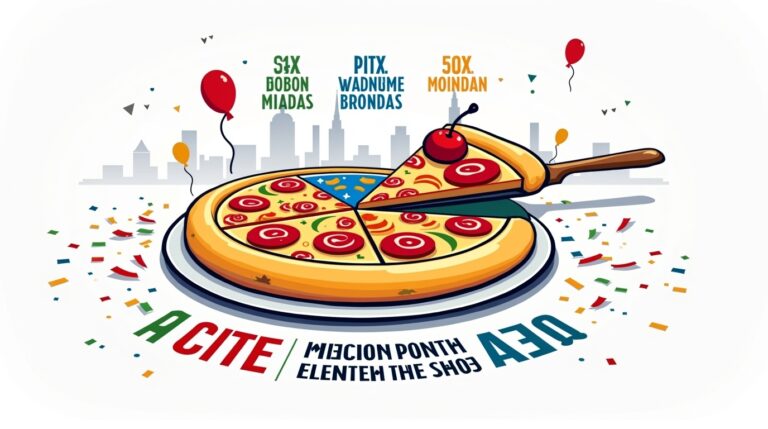The Moral Roots of Price Hike: Greed, Lust, and the Collapse of Economic Justice
Abstract
The moral roots of price hike, contemporary discussions around price hikes, and economic instability often centre on technical aspects such as inflation, currency devaluation, or supply-demand mismatches. However, this research aims to go deeper—beneath the surface of economic principles to uncover the moral and psychological forces that truly drive global economic unrest. At the heart of rising costs and deteriorating living standards lies an unchecked culture of greed, lust, and moral decay—rooted in both individuals and institutions. By connecting economic injustice to ethical failure, this study challenges the prevailing materialistic notion of prosperity defined by buildings, vehicles, and urban infrastructure. Instead, it proposes a moral benchmark: a truly prosperous nation is one in which even the poorest can live with dignity, security, and ease. Through religious insights, case studies, and philosophical critique, this work advocates for a re-humanised economic model based on justice, accountability, and compassion.
.https://mrpo.pk/when-noble-ideas-harm-a-nation/

Root of Other Evils
Inflation is primarily a moral problem in that the increase in the quantity of money and expanding of credit makes it possible for the government to meet its expenditures with money of a constantly decreasing nominal value. Coveting is also involved, because the politicians covet the wealth in the country and use inflation as a means of acquiring it for the development of an ever-increasing bureaucracy. Inflation is also bearing false witness. Those who are responsible for it claim that paper is money when it is not money. It is simply not true to say that a piece of paper backed by nothing is worth as much as a piece of paper backed by gold. Plainly stated, inflation involves an element of lying, coveting, and stealing. Under it government reaches into the safe deposit box of every individual and reduces the value of that which is within the box.https://fee.org/articles/inflation-is-a-moral-problem/
Introduction
In an era of global trade, high-speed banking, and digital currencies, the term “price hike” has become both a household concern and a complex economic phenomenon. Policymakers and experts offer a plethora of explanations—ranging from supply chain disruptions to fiscal mismanagement—often backed by graphs, indicators, and sterile terminology. Yet, these explanations, though technically sound, rarely address the human causes behind economic suffering. Why do prices really rise beyond the control of ordinary citizens? Why does the poor man’s burden increase even in times of national economic growth?
This research argues that the roots of price hikes are not purely economic—but deeply moral. Behind every unjust economic policy, exploitative trade deal, or manipulative market behavior lies a human choice fueled by greed, lust for wealth, and moral insensitivity. These are not flaws in the system—they are reflections of human character embedded in the system.
The modern world often celebrates prosperity by displaying skyscrapers, highways, luxury cars, and commercial zones. But true prosperity, we argue, cannot be measured by infrastructure alone. A nation cannot be considered economically successful if its poor cannot afford food, medicine, or shelter. Real prosperity lies in how the lowest class lives, not in how the elite invest. When a poor man can earn his bread and butter comfortably and without humiliation, the nation has truly prospered—regardless of how advanced its cities appear.
This work, therefore, goes beyond traditional economics. It explores price hikes as a symptom of a much larger disease: the erosion of moral consciousness in economic behavior. Through this lens, we aim to expose the ethical vacuum behind global economic policies and offer a framework for a more compassionate and equitable economic order.
Now we proceed to the section titled “Economic Principles and Their Limitations”.
2. Economic Principles and Their Limitations
Mainstream economics offers several technical explanations for price hikes: inflationary pressure, fiscal mismanagement, currency devaluation, supply shortages, and demand surges. These models are helpful for understanding short-term fluctuations and designing policy responses. However, when viewed as complete explanations, they obscure a deeper truth: these “forces” are ultimately driven by human choices and moral failures.
2.1 Inflation: A Controlled Monster?
Inflation is often explained as the result of too much money chasing too few goods. Central banks raise interest rates to reduce consumption, assuming that will bring prices down. Yet, this response rarely touches the structural greed behind inflationary episodes: cartels hoarding supplies, traders exploiting crises, and governments printing money to cover corruption or wars. Inflation, then, is less of a neutral outcome and more of a weapon wielded by elites against the vulnerable.
2.2 Supply and Demand: A Morally Neutral Fallacy
The principle of supply and demand is often treated like a law of nature. Prices rise when demand exceeds supply, and fall when the opposite happens. However, this principle is morally blind. It does not question why essential commodities are withheld during crises, or why luxury goods are mass-produced while basic foods become scarce. It legitimizes profiteering during natural disasters and economic manipulations during elections. It also permits dehumanizing logic—where the poor must suffer so that markets remain “efficient.”
2.3 Free Market Myth: Freedom Without Responsibility
The free market, as championed by modern capitalism, assumes that competition will ensure fair pricing and innovation. In reality, unregulated markets often become playgrounds for monopolies, speculation, and exploitation. When left unchecked, markets reward not moral enterprise but manipulative dominance—raising prices not because of real scarcity, but to maximize profit at the cost of human suffering.
2.4 Development Indicators: Concrete Deception
Most nations measure economic prosperity using GDP, foreign reserves, trade volumes, or infrastructure expansion. These indicators fail to reflect the actual condition of the common man. Skyscrapers and highways do not feed the hungry. Mall openings and car imports do not heal a sick child in a slum. This obsession with development optics ignores the harsh reality of the poor, who face unaffordable essentials while the state brags about “growth.”
True development must be defined morally: Can a poor man earn enough to feed his family without begging or crime? Can a widow buy medicine without fear? Can a child sleep under a roof with dignity? If not, then all the economic jargon is a lie—and all the progress is cosmetic.
Now we move to the heart of the argument.
3. Unmasking the Real Drivers of Economic Unrest
While economic theories provide mechanical explanations for market behavior, they often fail to confront the ethical dimensions of those behaviors. Behind every price surge, market manipulation, or artificial scarcity lies a conscious human act—driven not by necessity, but by greed, lust, and moral corruption. These vices, once considered spiritual maladies, now shape the very architecture of modern economic life.
3.1 Greed: The Engine of Economic Injustice

Greed is the relentless desire for the accumulation of wealth, resources, power without moral boundaries. In today’s global economy, greed is not only tolerated but institutionalised. From multinational corporations to local traders, the motive of “maximising profit” overrides all considerations of fairness or welfare. The results are everywhere:
- Hoarding of essentials during crises to sell at inflated prices.
- Cartelization of food, medicine, and energy sectors.
- Speculative trading on virtual assets while real economies bleed.
This greed-driven behaviour is often shielded by legality. But legality does not equal morality. When the market rewards those who exploit rather than those who serve, it becomes a breeding ground for injustice.
3.2 Lust: The Unseen Driver Behind Consumption and Excess

Lust is not confined to the carnal domain—it includes an insatiable craving for status, luxury, and dominance. Lust drives consumerism. It encourages people to buy more than they need, to spend beyond their means, and to worship brands over utility. This artificial demand, created by advertising and peer pressure, distorts markets and puts immense pressure on production, pricing, and supply chains.
Lust also explains why governments and corporations are willing to sacrifice ethics for image—developing vanity projects, mega malls, and cosmetic infrastructure while slums grow wider and the poor grow hungrier.
3.3 Lewdness and the Commercialisation of Morality
Lewdness in the economic sense refers to the moral nakedness of the market—a system in which everything is for sale, and nothing is sacred. Sex is sold to sell cars, obscenity is repackaged as “freedom,” and ethics are discarded for expedience. This moral decay leads to:
- The commodification of human bodies, especially women and children.
- An economy of desire, not necessity.
- The erosion of contentment and modesty, replaced by perpetual dissatisfaction.
This erosion of moral values results in hyper-consumption, the illusion of perpetual scarcity, and ultimately, persistent price instability—because enough is never enough.
3.4 Case Study: Everyday Exploitation in Developing Nations
In many developing countries, including Pakistan, price hikes are not always the result of global forces. They are the product of deliberate manipulation:
- Shopkeepers raising prices before religious festivals.
- Flour and sugar mafias engineering “shortages” through storage.
- Middlemen taking a lion’s share while farmers remain in debt.
These are not economic failures—they are moral failures. And until we recognize them as such, no policy or subsidy will fix the rot.
Having now uncovered the moral and psychological vices behind economic disorder, the next section will explore how religious and historical traditions—especially Islamic thought—understood and warned against these corruptions. It will also highlight prophetic guidance on economic justice and price control.
4. Historical and Religious Analysis: Ethical Anchors in Economic Thought
Long before modern economic theories were formulated, ancient civilizations and revealed religions had already laid down profound moral guidelines for economic behavior. Among them, Islamic teachings stand as a comprehensive framework for economic justice, emphasizing moderation, honesty, and responsibility. This section explores how religious guidance—especially from Islamic traditions—saw price manipulation, exploitation, and greed as not merely bad policy but as sins against society and the Creator.
4.1 Islam’s Moral Economy: A System of Justice, Not Profit Worship
Islam treats economic dealings not as a separate secular activity, but as a spiritual and moral undertaking. Every transaction is subject to accountability in the Hereafter. The Prophet Muhammad (ﷺ) emphasized fairness in weights and measures, condemned hoarding, forbade deceit, and held the market as a sacred trust of the community.
Key Teachings Include:
- “The merchants will be raised on the Day of Judgment as wicked, except those who feared Allah, were honest and spoke the truth.” — (Tirmidhi)
- The prohibition of riba (usury), gharar (uncertainty/deception), and ikhtikar (hoarding) reflects the moral stance that wealth must circulate fairly, not accumulate in the hands of the few.
Thus, price manipulation is not just a distortion of markets; it is an injustice to the people and a betrayal of divine trust.
4.2 The Prophetic Stance on Price Fixing and Exploitation
During the time of the Prophet ﷺ, people once came to him complaining about rising prices and asked him to fix them. He responded:
“Allah is the One Who fixes prices, withholds, gives lavishly, and provides. I do not want to meet Allah with anyone having a claim against me regarding blood or wealth.” — (Abu Dawood)
This shows his hesitation in artificial intervention but also indicates complete disapproval of unjust manipulation. The Prophet’s approach created an environment where trust, transparency, and mutual goodwill governed trade—not coercion or monopoly.
Moreover, his actions during the Medina era established the market as a public space, free from taxation, monopolization, or rent-seeking—a clear contrast to the elite-controlled economic spaces of today.
4.3 Zakat: Institutionalized Redistribution
Unlike modern economies that rely on indirect trickle-down theories, Islam mandates a systematic wealth redistribution mechanism—Zakat. This 2.5% obligatory charity on wealth is designed to cleanse both the wealth of the giver and the poverty of the receiver.
Zakat serves as:
- A moral filter to control greed.
- A social contract that binds the rich to the needs of the poor.
- A preventative mechanism against price hikes driven by deprivation.
By making generosity a legal obligation, Islam dissolves the economic walls between classes that lead to envy, hoarding, and unrest.
4.4 Other Spiritual Traditions and Economic Morality
While Islamic economics is a complete model, other traditions too have warned against moral lapses in trade:
- Christianity denounces love of money as “the root of all evil” (1 Timothy 6:10).
- Hinduism emphasizes dharma (righteous conduct) in business, advocating honesty, charity, and contentment.
- Buddhism promotes detachment from materialism as the path to peace.
Despite different doctrines, all agree: when morality collapses, economy becomes exploitation.
We have seen how sacred teachings connect the soul of the individual to the soul of the economy. In the next section, we will examine modern real-world examples of how moral decay in leadership, corporations, and consumer behavior results in economic crises, artificial price hikes, and growing inequality—thus confirming that spiritual failure precedes market failure.
5. Modern Examples of Moral Failure in Economics
Across the world today, economic instability and relentless price hikes are not anomalies—they are symptoms of a deeper disease. From Wall Street to local bazaars, from oil-rich kingdoms to indebted democracies, we find a consistent pattern: moral erosion at the top, exploitation in the middle, and suffering at the bottom. This section presents real-world examples to demonstrate that the root cause is not economic complexity—but ethical bankruptcy.
5.1 The Global Financial Crisis (2008): A Monument to Greed
The 2008 global financial meltdown was triggered not by war or natural disaster—but by institutionalized deception and greed in the banking system:
- Predatory lending practices targeting the poor.
- Collateralized debt obligations (CDOs) that disguised toxic assets.
- Rating agencies giving AAA ratings to junk.
The outcome? Banks were bailed out, millions lost homes and jobs, and inequality deepened. The real criminals walked free. What collapsed wasn’t just the market—but trust, accountability, and integrity.
5.2 The Corporate Capture of Essentials
In many countries, even life-saving necessities—like medicines, food, fuel, and education—are captured by corporate monopolies:
- Pharmaceutical giants inflate prices on insulin, cancer drugs, or vaccines.
- Agro-businesses push genetically modified seeds, trapping farmers in cycles of dependency and debt.
- Private educational institutions charge exorbitant fees while delivering mediocre outcomes.
These are not market outcomes—they are intentional strategies to commodify survival itself.
5.3 Pakistan’s Case: Exploitation Behind Every Price Hike
In the context of Pakistan, the poor are constantly crushed under the weight of price hikes that are often manufactured rather than natural:
- Sugar mafias create artificial shortages before Ramadan.
- Flour cartels withhold stock to drive up prices while government subsidies disappear into corruption.
- Real estate tycoons hoard land, pushing housing out of reach for the poor.
- Fuel pricing is manipulated under the cover of global oil shifts, when in reality, taxation, middlemen, and hoarding inflate domestic rates.
The repeated pattern is clear: a few grow richer while millions suffer in silence. The tools of injustice are often legal—but the intent is morally criminal.
5.4 Speculation and Artificial Scarcity: The Economy of Illusion
The global economy is increasingly becoming an illusion—built not on production, but on speculation:
- Commodities like wheat, oil, or gold are traded in volumes far greater than their actual physical presence.
- Hedge funds manipulate prices, betting on shortages, famines, and even wars.
- Cryptocurrencies rise and fall based on hype, not utility—enriching a few and misleading millions.
Speculation produces nothing. It extracts value from human hope and fear. This is no different from gambling—yet it is legal, praised, and glorified in the name of “innovation.”
5.5 The Poor Pay the Price for the Rich Man’s Game
In all of these cases, it is not the elite who suffer from inflation or price hikes—it is the daily wage laborer, the widow, the small farmer, the school teacher, the factory worker, and the urban poor. The economy remains a battlefield, but the rich are shielded and armed; the poor are exposed and unarmed.
When moral failure is normalized in boardrooms and bureaucracies, the market becomes a slaughterhouse for the powerless.
Having exposed the ethical failure in modern economic realities, the research now turns to solutions: What would a moral economy look like? Can we reimagine prosperity and economic policy through a lens of compassion, justice, and responsibility? How can we restore dignity to the poor and responsibility to the rich?
The next section will explore principles and frameworks for reclaiming a morally conscious economy.
6. Reclaiming a Moral Economy
The world has witnessed the catastrophic consequences of placing profit above people. To restore balance and dignity, a new economic vision must emerge—one not founded solely on mathematical models, but rooted in ethics and the sanctity of human life. A moral economy does not reject trade or wealth; it simply reorders their purpose—from exploitation to upliftment.
6.1 Redefining Prosperity: From Skyscrapers to Simple Bread
True prosperity is not how tall your buildings are or how many cars you import. It is how easily the poorest among you can earn, eat, heal, and sleep in peace. A prosperous nation is one where:
- A widow can afford medicine.
- A child can attend school without shame or fees.
- A worker can buy his family’s food without debt or bribe.
- A street vendor feels secure in his earnings and dignity.
Modern development models must abandon their addiction to glass and concrete, and instead be judged by the standard of the common man’s ease.
6.2 Ethical Trade and Transparent Markets
Markets are not inherently evil; they are spaces of exchange. But they must be governed by rules of honesty, transparency, and fairness. This includes:
- Public price display for essential commodities.
- Regulations against artificial shortages and collusive pricing.
- Protection of small traders and producers from corporate monopolies.
- Strict punishment for hoarders and tax evaders, not symbolic fines.
Markets must serve the people—not dominate them.
6.3 Zakat, Sadaqah, and Wealth Circulation
Islamic economic principles offer powerful tools to break cycles of poverty:
- Zakat (obligatory charity) as a systematic annual redistribution of wealth.
- Sadaqah (voluntary charity) as a culture of generosity and empathy.
- Waqf (endowments) to support public welfare—education, healthcare, orphanages, etc.
If applied sincerely, these mechanisms can restore economic mobility and reduce resentment between classes. They make the economy not just a machine, but a moral community.
6.4 Educational Reform: Teaching Economics with Ethics
A major cause of economic immorality is that we train future traders, bankers, and policymakers without moral education. Universities teach profit maximization but not contentment; wealth growth, but not wealth sharing.
We must:
- Introduce moral philosophy and religious ethics into economic education.
- Teach historical lessons of economic collapse due to greed.
- Encourage youth to serve society, not exploit it, through entrepreneurship.
6.5 Institutional Accountability and Public Participation
Economic reforms will fail without political will and public voice. To ensure a just economy:
- Institutions must be made transparent and participatory.
- Policies must be monitored for their real-world effects on the poor.
- Whistleblowers, journalists, and civil society must be protected to expose corruption.
- Government and business leaders must be held morally and legally accountable.
6.6 Restoring Human Contentment
Lastly, a moral economy must cultivate the spiritual virtues that guard against greed:
- Contentment (Qana’ah) – believing one has enough.
- Gratitude (Shukr) – recognizing blessings and avoiding envy.
- Trust in God (Tawakkul) – not fearing loss so much that one cheats or hoards.
No system can thrive where the soul is empty and the heart is restless.
With the framework now laid, the next sections will offer a comprehensive conclusion, summarize core insights, and provide concrete recommendations for moral economic reform at individual, institutional, and national levels.
7. Conclusion
The crisis of price hikes, inflation, and economic injustice is not simply a matter of numbers, policies, or trade cycles. It is a moral failure—a failure of individuals, institutions, and societies to restrain their greed, their lust for power, and their disregard for the weak. What we face today is not an economic malfunction but a spiritual collapse masquerading as market dynamics.
This research has demonstrated that the roots of economic instability lie deeper than supply chains or fiscal policy—they lie in the corruption of the human heart. When desire is unrestrained, when wealth is hoarded, and when poverty is ignored, no model—capitalist, socialist, or mixed—can deliver justice.
The world does not suffer from a lack of resources, but from a lack of fairness. The poor do not suffer because there is no food, but because someone stores it in a warehouse until the price doubles. Price hikes are not mysterious forces—they are the result of choices made by the greedy and tolerated by the silent.
True prosperity can only return when the dignity of the common man becomes the measure of success. A nation is not wealthy if its elites fly in jets but its poor cannot afford wheat. The path forward must be grounded not just in economic theory, but in moral philosophy, religious guidance, and human compassion.
8. Recommendations
To build a just and stable economy that serves all layers of society—especially the most vulnerable—the following steps are recommended:
8.1 Individual Level
- Cultivate contentment and gratitude as personal values.
- Avoid unnecessary consumption and waste.
- Support small businesses and ethical producers.
- Pay Zakat and Sadaqah proactively and purposefully.
8.2 Community Level
- Establish community markets with fair pricing mechanisms.
- Build local Zakat distribution systems for food, medicine, and school fees.
- Create watchdog groups to monitor local price manipulation.
- Promote awareness on ethical trade and anti-hoarding campaigns.
8.3 Institutional Level
- Enforce strict anti-cartel and anti-hoarding laws, with real penalties.
- Create transparent price regulation bodies insulated from political pressure.
- Make supply chain data public to prevent artificial shortages.
- Reform taxation to ease the burden on essentials and penalize luxury hoarding.
8.4 Educational and Cultural Level
- Integrate moral and ethical education into economics, business, and trade curriculums.
- Promote role models of economic justice from Islamic history and global tradition.
- Use media to highlight the human impact of price manipulation and greed.
8.5 Government and Policy Level
- Redefine national prosperity indicators based on poverty alleviation and accessibility, not GDP alone.
- Ban speculative trading of food and essential commodities.
- Nationalize or tightly regulate core essentials like food, fuel, and medicine to prevent private monopolies.
- Appoint independent audit commissions to review market integrity.
9. A Final Word
This research is more than an academic reflection—it is a moral call to action. Until we stop viewing price hikes as “inevitable” and start viewing them as moral crimes against the poor, no policy reform will matter. We need not only better systems, but better souls. It is time to realign economics with ethics, trade with truth, and policy with piety.
Let us return to the simple truth: A society is only as strong as the comfort of its weakest.



